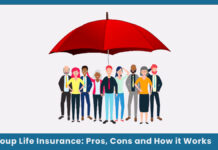Being self-employed, whether as a freelancer or a solo entrepreneur, comes with its challenges, underscoring the importance of self-employed insurance.

Beyond managing clients, it’s important to shield your business from potential financial setbacks such as injuries, property damage, and legal issues.
Therefore, you should consider self-employed insurance as a personalized insurance plan to cover the risks your business might encounter.
Typically, a self-employed insurance policy encompasses various types of small business insurance coverage to address a spectrum of potential issues.
This can include protection against lawsuits, coverage for lost income from incidents covered by your policy, and compensation for damage to your business property. What’s more? Let’s keep reading to be enlightened.
What Is Self-Employed Insurance?
Self-employed insurance helps freelancers, contractors, and sole traders stay protected. While enjoying the freedom of working for yourself, it’s vital to know the risks.
If something unexpected happens or there’s a problem, you might have to pay for it yourself. But with a self-employed insurance policy, you don’t have anything to worry about, as your insurer will take care of that.
Types Of Insurance Needed As a Self-Employed
Choosing the right types of insurance for self-employed professionals or solo entrepreneurs depends on the nature of their work. However, the majority of self-employed insurance policies generally encompass the following coverage:
General Liability Insurance
General liability insurance is the most recognized coverage purchased by self-employed individuals and other small enterprises.
This insurance safeguards against the expenses of third-party bodily injury or property damage arising from accidents at your business or during routine operations.
However, many clients or companies may require proof, typically in the form of a certificate of insurance, before engaging your services.
Commercial Property Insurance
Even if you operate from your house, commercial property coverage is essential for safeguarding your workspace, including contents, inventory, furniture, and electronics.
This coverage protects against various perils such as fire, burst water pipes, theft, vandalism, and severe weather events like tornadoes or windstorms.
However, if you run your business from home, your residential home or condo insurance may not cover losses related to business activities. This situation might occur as home policies are not typically designed to provide such protection.
Professional Liability Insurance
Professional liability insurance, also known as errors and omissions (E&O) insurance, is necessary if your work entails advising clients, providing services, or developing products for them.
In the event of errors, accusations of negligence, or failure to deliver promised outcomes resulting in financial losses for your clients, you may be held responsible.
Professional liability coverage can cover this risk through legal expenses in the event of a lawsuit and any damages awarded to the client.
Commercial Auto Insurance
If your self-employed business involves the use of a vehicle for transporting people, materials, or goods. It’s essential to consider obtaining a commercial auto insurance policy.
However, personal car insurance doesn’t cover accidents involving vehicles used for business purposes. But a commercial auto insurance policy provides the necessary coverage for such events.
How Much Does Self-Employed Insurance Cost?
The principal expense of self-employed insurance is influenced by several factors, such as:
Number Of Employees
The more workers you employ, the higher your workers’ compensation premiums are likely to increase.
Insurance Coverage Needs
The types of coverage and policy limits you choose will impact your rates. Typically, higher coverage amounts result in higher premiums.
Prior Claims History
Your insurance company providers assess your business’s claims track record history when determining your interest rates.
Other Pricing Factors
Additional factors that can affect your self-employed insurance premiums include your business location, the size of your payroll, and the value of business assets and property owned.
Who Needs Self-Employed Insurance?
The Internal Revenue Service classifies individuals as self-employed if they meet any of the following criteria:
- Operating a business or trade as an independent contractor or sole proprietor.
- Being a member of a partnership engaged in business or trade.
- Being self-employed includes running a part-time business.
If any of these conditions describe your professional situation, you will likely require self-employed insurance.
Ways To Get Affordable Self-Employed Insurance
Here are five effective methods to secure the right self-employed insurance plan that fits your requirements and financial budget:
Request For Recommendations
Initially, engage with friends, fellow self-employed individuals, or small business owners to gather recommendations regarding insurance providers.
Afterward, conduct online research to evaluate the reviews and feedback from current and past customers of these insurers.
Collaborate With Business Insurance Brokers
Possessing a licensed business insurance broker will simplify your search for cost-effective coverage. A broker serves as a trusted advisor, clarifying tough insurance terms and creating a personalized policy to ensure the best coverage without overpaying.
Engage With Local Industry Groups
Explore potential discounts on premiums offered by business insurance partners with industry groups, local Business Improvement Associations, or Chambers of Commerce.
These partnerships may provide exclusive benefits to members of the local business community.
Assess The Cost Of Risk
Every individual seeks an affordable insurance policy, but focusing on the low premiums could leave you underinsured.
For example, if you are underinsured and make a claim for an uncovered incident, it will result in significant financial losses than a yearly premium.
Select for Higher Deductibles
A deductible represents the portion of expenses you’re responsible for in case of damage or loss covered by your insurance policy. You have the flexibility to select your policy’s deductible amount.
Moreover, selecting a higher deductible leads to lower annual premiums, and it continues the other way around.
Conclusion
Being self-employed offers much freedom, but it also exposes individuals to certain risks. However, self-employed insurance serves to safeguard against potential challenges and liabilities encountered by sole traders in their business operations.



